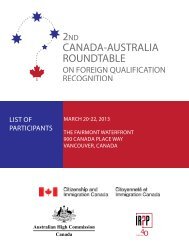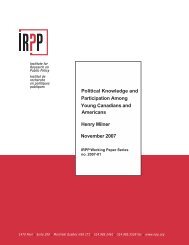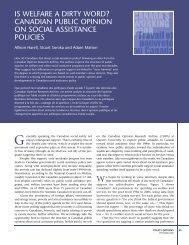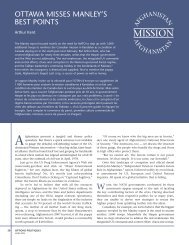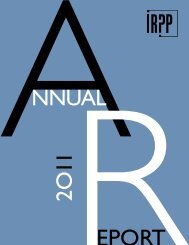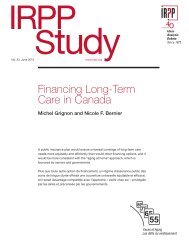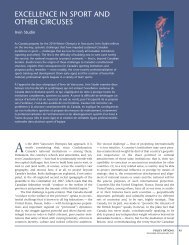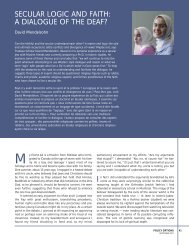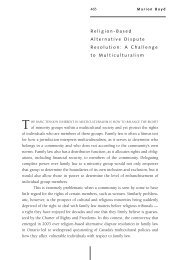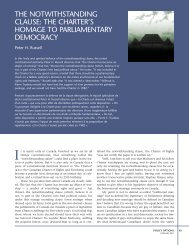THE SAGA OF BILL C-30: FROM CLEAN AIR TO CLIMATE ...
THE SAGA OF BILL C-30: FROM CLEAN AIR TO CLIMATE ...
THE SAGA OF BILL C-30: FROM CLEAN AIR TO CLIMATE ...
Create successful ePaper yourself
Turn your PDF publications into a flip-book with our unique Google optimized e-Paper software.
The new Act was further vulnerable<br />
to a future court challenge through its<br />
poor drafting. The definition section<br />
split GHGs apart from air pollution,<br />
clearly defining “air pollution” so as not<br />
to include “greenhouse gases” (GHGs).<br />
It was all rather odd, unless it was deliberate.<br />
The “purpose” section of 5.1 then<br />
went on to assert that the goal of the<br />
new Clean Air Act was to reduce “air pollution,”<br />
with no reference to greenhouse<br />
gases or climate change. Needless<br />
to say, the word “Kyoto” did not appear<br />
anywhere in the Act.<br />
The whole GHG section of the Act<br />
appeared designed to fail.<br />
In addition to the strange and<br />
weakened air quality and greenhouse<br />
gas sections of Bill C-<strong>30</strong>, there were a<br />
few useful new tools. They would usually<br />
have been referred to as “housekeeping<br />
measures.” Previous regulations<br />
had not allowed governmental<br />
control of products that create emissions,<br />
like wood stoves. Previous regu-<br />
The saga of Bill C-<strong>30</strong>: from clean air to climate change, or not<br />
lations had failed to have sufficient<br />
flexibility for the blending of ethanol<br />
fuels. These items were tidied up.<br />
The only useful and innovative<br />
things in C-<strong>30</strong> were a passage<br />
enabling the creation of National Air<br />
Quality Objectives, the inclusion of<br />
“indoor air quality” and the resuscitation<br />
of the long-comatose Canadian Motor<br />
Vehicle Fuel Consumption Standards Act.<br />
The regulation of vehicle emissions<br />
was announced in general in Harper’s<br />
Vancouver photo op. In the context of<br />
this article’s undercurrent of overhyped<br />
environmental laws and weak<br />
delivery, the vehicle fuel regulatory<br />
scheme is likely the champ of all time.<br />
In 1981 the Parliament of Canada<br />
passed the Motor Vehicle Fuel Consumption<br />
Standards Act. Carmakers, in a panic,<br />
went to Prime Minister Trudeau and<br />
begged for the Act to be scrapped.<br />
Regulations to deliver fuel economy had<br />
been passed in the United States, where<br />
they were known as Corporate Average<br />
Fleet Economy (or CAFE), but Canadian<br />
carmakers (being American carmakers)<br />
lobbied hard against anything but voluntary<br />
measures. The Bill was never proclaimed.<br />
The threat of this law was the<br />
basis of a voluntary agreement between<br />
carmakers and the government in the<br />
early 1980s. That voluntary agreement<br />
was the source of Canada’s CAFE standards<br />
for about 20 years. The agreement<br />
required the same standards in Canada as<br />
in the United States. It was successful<br />
until Canada expressed a desire to go<br />
beyond US law and establish a Canadian<br />
standard in Prime Minister Chretien’s<br />
first Kyoto plan in 2000. Nevertheless,<br />
the Canadian government persisted in<br />
wanting a voluntary agreement.<br />
However, this time, unlike the 1980s,<br />
there would be no US law forcing the<br />
manufacturers to improve efficiency.<br />
U ltimately,<br />
Jason Ransom, PMO<br />
The “bright and badly used” Rona Ambrose, then minister of the Environment, was under constant fire in the House last year. She bore<br />
the brunt of the criticism for the Harper government’s bungled rollout of the Clean Air Act, and was moved off the firing line in a<br />
January cabinet shuffle that saw her replaced by the combative John Baird.<br />
a new voluntary<br />
approach was negotiated and<br />
POLICY OPTIONS<br />
MAY 2007<br />
45




